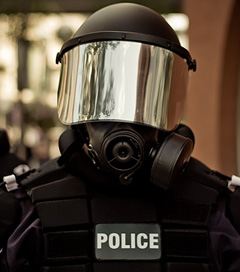Honest, paywall-free news is rare. Please support our boldly independent journalism with a donation of any size.
Several dozen Occupy Wall Street demonstrators were sleeping on the cushioned pews of a United Methodist church on the Upper West Side on Thursday morning when one of them spotted a man in plainclothes wandering through the sanctuary, apparently counting heads.
Flustered, the demonstrator confronted the man, who after several moments identified himself as a plainclothes detective.
The demonstrator called the pastor, who was sleeping next door. But by then, the detective had left, along with his partner, who had been asking questions at a homeless shelter in the church’s basement.
Several area churches have been sheltering protesters in the days since the city banned sleeping in Zuccotti Park, and church officials said they were alarmed by the idea that the police might be monitoring their conduct.
“It is disconcerting that they would actually enter the sanctuary,” said the Rev. James Karpen, known as Reverend K, senior pastor of the United Methodist Church of St. Paul and St. Andrew, on West 86th Street. “Here we had offered hospitality and safety, which is our business as a church; it just felt invasive.”
A police spokesman, however, said the officers were simply answering nature’s call.
“Two plainclothes officers entered the location and walked downstairs to use the bathroom,” said Paul J. Browne, the New York Police Department’s chief spokesman. “On the way out, they were asked to identify themselves, and they did. Not exactly clandestine conduct.”
About 46 protesters had spent Wednesday night in the church. Just before 6 a.m. on Thursday, as the demonstrators began to stir before a major downtown protest, the two men in plainclothes came to the church door and asked the doorkeepers if they could use the bathroom, according to Mr. Karpen.
Instead, both men entered the sanctuary, one remaining near the door while the other advanced down the aisle, apparently counting the demonstrators in the pews, according to a witness who reported the episode and who asked his name not be published because he feared harassment by the police.
One of the men then went downstairs to a homeless women’s shelter, run in cooperation with B’nai Jeshurun, a local synagogue, and asked for information about who was sleeping there, said Elissa Weiss, the volunteer on duty.
“A man who said he was an undercover policeman, but who neither introduced himself by name nor showed me a badge, started to approach the room where the guests sleep,” Ms. Weiss said in an e-mail. “He asked how many slept down there. I didn’t think that was any of his business, so I gave him the public information, which was that we have as many as 10 guests each night.”
A demonstrator then confronted the men and asked them to write down their names and badge numbers. One identified himself as Detective Kevin G. Clancy, who according to 2006 police records is assigned to the intelligence division of the New York Police Department. The men then left.
“They are welcome to come in if they just say who they are,” Mr. Karpen said. “We have never had that kind of issue with the police before. Usually, they are very respectful of church-state issues.”
Mr. Karpen wound up escorting the protesters out a back door because, he said, there was an unknown woman photographing people leaving the church’s main entry.
Church officials said two other police intelligence officers had visited them earlier that day, after the congregation hosted about a dozen protesters on Tuesday night. Those officers said they were following up on an anonymous report of vandalism, according to Siobhan Sargent, an associate pastor, who said that no vandalism had taken place.
“They proceeded to ask me if anyone was sleeping there,” Ms. Sargent said. “I said yes, we had occupiers from Occupy Wall Street, who asked for a place to stay.”
Ms. Sargent said she was told by the officers that they did not want anything to happen to the church and that there was risk to letting people sleep there. Ms. Sargent said she told the officers “that’s what the church is for.”
Police officers may enter a place of worship if they have suspicion of unlawful activity, said Donna Lieberman, the executive director of the New York Civil Liberties Union. However, if they are conducting surveillance without cause, and “got in by fraud and deception” if their bathroom visit was only a pretense, “that is trespassing,” she said.
“It raises concerns about whether this is in keeping with the limitations on police infiltration of political activity under the Handschu agreement,” which proscribes procedures on police surveillance, she said.
None of the several other churches which hosted protesters reported a similar confrontation. The Riverside Church, in Morningside Heights, hosted about 60 protesters without incident, said Allison Davis, the church’s director of communication. At Judson Memorial Churchnear Washington Square Park, ministers believed that several plainclothes police officers had entered the hall where about 100 protesters were sheltering, but elected not to ask them who they were, believing that if they asked one person for identification, they would have to ask them all.
“We thought if the police want to come in, then let them spy, then let them look,” said the Rev. Michael Ellick, the minister there.
Media that fights fascism
Truthout is funded almost entirely by readers — that’s why we can speak truth to power and cut against the mainstream narrative. But independent journalists at Truthout face mounting political repression under Trump.
We rely on your support to survive McCarthyist censorship. Please make a tax-deductible one-time or monthly donation.
